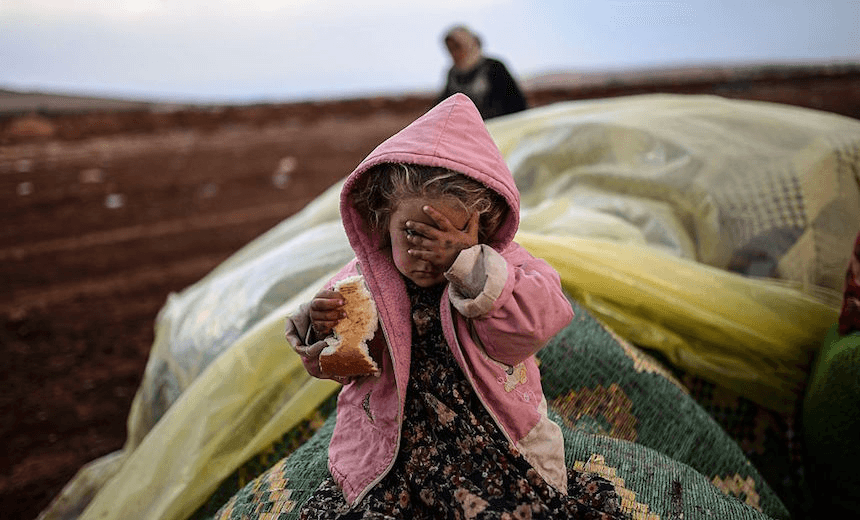This week, the newly-formed Government confirmed its policy is to double the country’s refugee quota. Red Cross migration programmes manager Rachel O’Connor says the priority now is ensuring its swift implementation.
Two years ago, a single photo haunted the world’s consciousness and galvanised the global community into taking action to address the largest humanitarian crisis since World War II.
Alan Kurdi was a three-year-old Syrian boy who was forced to flee his home city of Homs in search of safety. In desperation, his parents boarded a boat to seek safety on the other side of the Mediterranean. The tragic ending was a photo of Alan’s lifeless body lying face down on the shore of a Turkish beach.
The photo went viral and quickly provoked an international response.
Here in New Zealand, Red Cross immediately started fielding phone calls from members of the public who were desperate to do something to help address the global refugee crisis.
Applications to become Red Cross refugee support volunteers spiked and Red Cross shops started receiving an increasing number of donations for former refugee families. Media requests were coming thick and fast and the New Zealand Government created 600 new resettlement places for Syrian refugees over three years.
Fast forward two years and the issue has fallen from the front pages. But the global humanitarian situation has only deepened, so much so that we now face a crisis unlike any other in modern history.
The seriousness of the situation cannot be overstated. Whether due to new conflicts merging with mass displacement, or existing, intractable conflicts, tens of millions of people across the world are faced with impossible decisions, dangerous journeys, and uncertain futures.
There is no indication that an end is in sight. In fact, it is only likely to continue to get worse.
There are more than 22 million refugees globally and the United Nations refugee agency (UNHCR) says 1.2 million of them urgently need resettlement over the next year. Despite this level of need, less than 8% will find safety through this avenue.
These numbers will only grow.
In these past eight weeks alone, more than 600,000 people from largely Muslim communities in Myanmar’s Rakhine state have been forced to flee their homes due to escalating violence. Most have crossed the border into Bangladesh where they will become refugees, joining 200,000 others who have already fled over the past few years. Still more remain stranded inside the country’s borders.
This week, the newly-formed New Zealand Government confirmed its policy is to double the country’s refugee quota, the first significant increase since the 1980s.
It is a welcome step toward addressing this global humanitarian crisis. The priority now must be ensuring that it is implemented swiftly in order to save lives. We at Red Cross are ready to respond to the urgent need.
Following Alan Kurdi’s death, New Zealand created 600 extra places in the quota for Syrian refugees over the course of three years. It took less than six months from the time this announcement was made to welcoming the first group to their Wellington homes.
This was soon followed by the announcement that Dunedin would become a refugee resettlement location after a major push by the community. Again, it took just two months for the New Zealand Red Cross to establish its refugee programmes in the city and begin welcoming the first former refugees to Dunedin.
This shows how this new increase can be implemented just as quickly. If that occurs, we have the best chance of saving lives.
More than 800 Kiwis a year already volunteer their time to help former refugees settle into cities around New Zealand, helping them rebuild their lives while also strengthening cultural connections within their communities. An increasing number of Kiwi businesses are also already working with New Zealand Red Cross to hire people with refugee backgrounds in recognition of the valuable contribution they can make to New Zealand’s social and economic fabric.
The Red Cross is confident in our capacity to meet the need created by any quota increase and we recognise the importance of doing it quickly.
While it’s easy to think of refugees as numbers and statistics in faraway places, the people we work with every day are mothers and fathers, brothers and sisters, sons and daughters, and above all, people.
To delay this increase is to undermine the protection of these people and delay their chances of safety and starting a new life.
I was at the Dunedin airport the day the first Syrians arrived. The sound of applause as the plane carrying the new arrivals landed is something that has stuck with me to this day. The whole airport started clapping and I wasn’t the only one crying. During the welcome ceremony, one of the new Kiwis, a father from Syria said “your welcome has planted seeds of hope in my heart”.
We Kiwis are in a position to plant a few more seeds of hope where they are desperately needed and if we have the capacity to ease just one person’s suffering, then we as a country should do it as quickly as possible.
The Society section is sponsored by AUT. As a contemporary university we’re focused on providing exceptional learning experiences, developing impactful research and forging strong industry partnerships. Start your university journey with us today.
